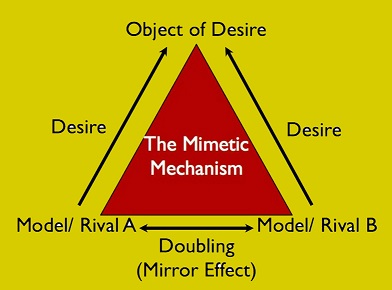
René Girard’s Mimetic Theory changed the way I looked at my desires
“Man is the creature who does not know what to desire, and he turns to others in order to make up his mind. We desire what others desire because we imitate their desires.” – René Girard.
Advertisement
I grew up wanting to make money. My father and everyone within his orbit were in on the game. We hardly knew professionals like doctors, lawyers, writers or engineers. Everyone around us was entrepreneurial, trying to make money.
By midlife, on a whim, I started to write. I enjoyed the self-expression, the solitude and how writing helped me grow in self-awareness. The deeper I got into the writing world, the more I desired that life. Who wouldn’t want to be Hemingway?
For the last ten years, I have told anyone who listened that my dream is to go on a solo trek to Tibet. I wanted to be alone with my inner self while being mindful of the simpler things in life.
I have always been convinced that I was following my deepest desires in each situation above. I thought that my longings were independent and autonomous.
Question
However, 20th Century French anthropologist René Girard made me question all my assumptions.
“We would like our desires to come from our deepest selves, our personal depths,” he said, “but if it did, it would not be desire. Desire is always for something we feel we lack.”
What if our desires were not ours – not something that was under our control or something we manufactured. Instead, desire was a social process – it was mimetic. In other words, we want what other people want.
This assumption that our desires are all our own and the stories that we tell ourselves is what Gerard calls “The Romantic Lie.”
Was it my desire to make money, or was it what I saw everyone around me want so badly that made me want it too? What if I fell in love with writing because of Hemingway’s character and passion for life? Was it my desire to travel to Tibet, or was it supplanted into my subconscious by the 1997 movie Seven Years in Tibet featuring Brad Pitt?
Unlike basic needs (food, shelter, relationships, security), our wants are not instinctual but instead fall under mimetic desire. We follow people who show us what is worth wanting.
The people we imitate are those we believe are higher up the ladder that we are climbing. We hold them (models) in such high esteem that we never stop thinking about whether the ladder we ascend is leaning on the wrong wall.

What makes it worse is that we are not always aware that our mimetic desires run below our conscious thoughts and that it rules our thinking and goal setting.
A point that the corporate world and the social media giants have been quick to take advantage of, and as such, they make sure they control where we put our attention. We are concerned with what Girard calls the metaphysical desire: the desire of another’s desire and not the object itself.
Picture the instance when we see a beautiful woman wearing the latest Christian Louboutin heels or a semi-naked man in Lululemon pants bearing his six-pack, we don’t really desire the shoes or trousers. Instead, we want their face, their bodies, and how appealing they look.
We imagine we would become a newer and better version of ourselves when we buy what they are wearing. We don’t buy stuff for its quality, longevity or comfort, though many convince themselves they do. As a result, the things that we desire lose their objective qualities.
What can we do to stop being caught in this mimic whirlwind that social media has exasperated?
Two kinds
Girard has identified two kinds of models with whom we have different relationships.
A) External mediator of desire
These are people who are not in our inner circle. There is a distance between them and us. Whether that barrier is death, status, money or time, there will be no competition with those people. They can affect our desires, but we can’t affect theirs.
These are famous people we’ve grown up idolising, like Michael Jordan, Steve Jobs, Ernest Hemingway, Coco Chanel and Oprah Winfrey. But, of course, it could also be a distant uncle (or some family member) who was revered by our immediate family and us.
Many of these models are positive as they help us aspire to become better people without fear of rivalry. However, we still need to be wary of the imposter syndrome that can grow within us when we start to compare our results to theirs.
Also, whether it’s the Kardashians making glamour look like the only life worth living for or Floyd Mayweather flaunting dollars on his Instagram account, expressing that only money matters, we must question the values of these famous public figures.
B) Internal mediator of desire
These people that we model here are usually too close for comfort. They could be friends at school, spouses, siblings or other immediate family members, colleagues at work, or social friends we hang out with. Here there is no barrier, and competition is rife. It’s also a two-way stream in that we affect them as much as they affect us.
The ‘trying to keep up with the Joneses’ complex comes up here, and our fear of missing out gets activated all the time, directing us to live in perpetual anxiety, envy and frustration.
Think of siblings who have fought over their family business, beautiful people having one plastic surgery after another to try and compete with their friends, or someone jumping on the NFTs bandwagon only because he heard a close friend did so (instances I’ve witnessed in the past 18 months).
Easier
It is always easier to spot how desires exist in the lives of others, but genuine learning is in seeing how patterns of desire interweave, sometimes unconsciously, within our own lives.
Truth is, Hemingway, amongst other writers, had a significant influence on me, but it was a positive one. When I noticed that, I took ownership of it, and from that viewpoint, I started creating the new life I wanted.
I was content and fulfilled when left alone to reflect on my thoughts, examine my behaviour and discern the knowledge I was discovering from those excellent writers.



